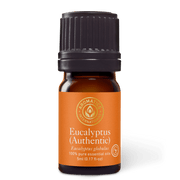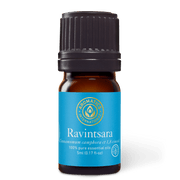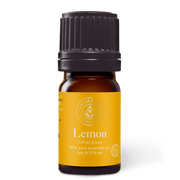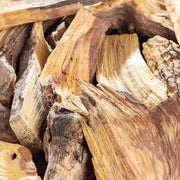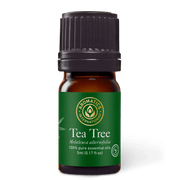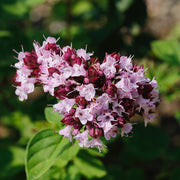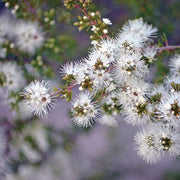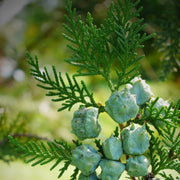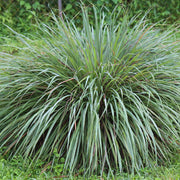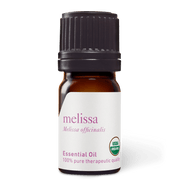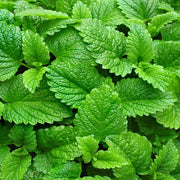Using essential oils for seasonal colds can help you stay at peak health! Essential oils can safeguard your immune strength, reduce your exposure to health threats, and support open, easy breathing, and alleviate symptoms during cold and flu season. You can use essential oils to keep your energy up when you feel unwell, and to help yourself get deep, restorative rest when you’re sniffling at night.
You don’t even need a huge collection of essential oils for cold season to accomplish any of this. When you know which natural components have been shown in research to offer the benefits you need, you can choose essential oils that include high percentages of those components.
This post collects that information in one place for you!
You’re about to learn 5 researched components that can help you survive the common cold, and which essential oils contain them. You’ll also find popular ways to use these top essential oils for cold and flu season safely, and recipes to keep your immune system strong and soothe symptoms.
Let’s jump right in!
Essential oils for cold and flu season: natural components that work!
While each of the following components has its own “personality,” they all share one common property: They’re exceptionally purifying! They’ve all been researched for their actions in the presence of microbes.
Essential oils rich in these components are often used in natural cleaning recipes because of their amazing cleansing properties.
Learn why green cleaning is safer for your family than using harsh products!
Just as you can use essential oils rich in these components to help purify your home of unwanted microscopic “visitors,” you can use them to protect your immune system.
1,8-cineole

Look for essential oils rich in 1,8-cineole if you have cold or flu symptoms but still have to go to work.
1,8-cineole is an oxide component that’s also known as “eucalyptol.” We’ll bet you guessed that eucalyptus oil (Eucalyptus globulus) contains huge amounts of it!
Seeing that an essential oil contains high percentages of 1,8-cineole can alert you that it may be very useful for supporting your breath. 1,8-cineole has been shown to clear respiratory problems, and to create an easy, open sensation in the nose and chest. To fight nasal congestion, inhale essential oils high in 1,8-cineole!
1,8-cineole can also clear your head so you feel more mentally alert.
Essential oils containing 1,8-cineole
1. Eucalyptus Oil (Eucalyptus globulus)
2. Ravintsara Oil (Cinnamomum camphora ct 1,8-cineole)
3. Saro Oil (Cinnamosma fragrans)
d-Limonene

Use d-limonene-rich essential oils to boost your mood!
d-Limonene is a monoterpene that shows up in citrus oils, such as sweet orange essential oil and lemon essential oil - and many other essential oils.
This powerhouse component can support your body’s natural immune response, helping you feel like yourself more quickly if you come down with something. d-Limonene-rich essential oils can also soothe discomfort in sore, tender areas. As d-limonene allows your body to relax, it makes space for your breath to flow more easily.
Feeling good about d-limonene yet? It’s also been shown to ease stress and bring in more happy energy—a welcome change during cold and flu season!
Essential oils containing d-Limonene
2. Sweet Orange Oil (Citrus sinensis)
3. Palo Santo Oil (Bursera graveolens)
Terpinen-4-ol

Reach for essential oils rich in terpinen-4-ol to make super-potent natural cleaning blends.
This is an incredibly potent purifying component! Terpinen-4-ol is a monoterpenol with a wide spectrum of purifying actions.
Essential oils containing terpinen-4-ol are helpful during cold and flu season, and year round when microbes are present (it also has antifungal properties). Use them to purify your indoor air in diffuser blends, or in inhalers to send the terpinen-4-ol right where you need it most (your airways).
Oils rich in terpinen-4-ol (such as tea tree oil) can reassure you emotionally that you’re being cared for. Many, like tea tree oil, have a sharp, penetrating note that reminds some people of being in clinical settings.
Essential oils containing terpinen-4-ol
1. Tea Tree Oil (Melaleuca alternifolia)
2. Marjoram (Sweet) Oil (Origanum majorana)
3. Plai Oil (Zingiber cassumunar)
α-Pinene

Use essential oils rich in α-pinene to support physical and emotional calm, as well as immunity.
Like terpinen-4-ol, α-pinene has a wide range of purifying benefits.
It’s a monoterpene that can help the body release tension and spasms, bringing comfort to achy muscles during cold and flu season. These relaxing effects can also help you breathe more deeply—since relaxation and deep breathing go hand in hand.
α-Pinene-rich oils tend to have soothing emotional effects too. While most won’t make you too sleepy, they can help both your body and mind feel calm in the face of stress.
Essential oils containing α-pinene
1. Frankincense Sacra Oil (Boswellia sacra)
2. Kunzea Oil (Kunzea ambigua)
3. Cypress Oil (Cupressus sempervirens)
Citral

Use citral-rich oils to help yourself relax and sleep when you have a cold.
What we call “citral” is actually a combination of two natural components: neral and geranial. When they occur side by side, they support one another’s actions so beautifully that we can consider them as one, and call them “citral.”
Research has shown citral powerfully effective against certain microbes. Use citral-rich oils to purify your environment so you’re less vulnerable to health threats during cold season. Or try a citral-rich blend to surround yourself in a protective “barrier” of immune-support!
Citral is also deeply relaxing. As it encourages your body to rest, it calms your mind so you can get some restorative sleep.
Essential oils containing citral
1. Lemongrass Oil (Cymbopogon citratus)
2. Lemon Myrtle Oil (Backhousia citriodora)
3. Melissa Oil (Melissa officinalis)
Learn more about using essential oils based on chemical components!
Boost your chemistry confidence with our free guide, Aromatherapy for Professionals. You’ll discover more about the components mentioned above, as well as a few others. Whether you blend for family or clients, this guide will help you target your blends to specific health issues to support natural wellness.
5 Ways to use essential oils for cold season
1. Steam inhalation
Inhaling steam is a traditional way to help unclog a stuffy nose during cold season.
Adding a single drop of essential oil to a bowl of steamy water can take this soothing experience to the next level!
You can choose a single essential oil to steam with, or make a “stock blend”: combine several potent essential oils in a 5 ml bottle, and then add a single drop of that blend to your steamy water. Drape a towel over your head, close your eyes, and lean over the bowl to breathe in the steam.
The great thing about a stock blend is that now you can use it in other ways too. (Try it in an inhaler or a chest rub!)
Safety note Be careful working with hot water and steam. It’s helpful to already have your bowl on the table or countertop when you pour the hot water into it, so you’re not trying to carry a bowl of hot water.
If you get more than a few drops of essential oil in your steam, set it aside and start over. Steaming is a very potent way to use essential oils, and using too much essential oil can quickly overwhelm you, causing reactions such as headaches.
Steam recipes
2. Essential oil inhalers
Using a personal inhaler delivers soothing essential oil components right to the “scene of the action”—your nose and sinuses!
Inhalers are convenient. They’re easy to make, and they fit right in a pocket, purse, or bag. You can use an essential oil inhaler to fight cold and flu symptoms anytime, anywhere, and nobody will smell the essential oils but you.
Inhaler recipes
3. Chest rubs
Massaging a blend of essential oils for cold season over your chest and neck means you can lay back and relax, breathing in the nourishing components, while the oils are also absorbed into your body through the skin over your lungs. Using a carrier oil like coconut oil and essential oils, you can ease cold and flu symptoms and take care of your skin.
Chest rubs are also soothing when you’re just going about your day! You may not be able to smell the oils as easily, but they’re still being absorbed through your skin.
Chest rub recipes
4. Body oils
A cold care body oil moisturizes your skin while surrounding you in the benefits of protective, immune-supporting essential oils!
You can use a body oil after your daily shower or bath and reapply it as often as you like. Try carrying a bottle with you on the go, to moisturize your hands after frequent washing.
Body oil recipes
5. Essential Oil Diffuser blends
Diffusing essential oils for cold season allows you to purify your indoor air while also breathing in the nourishing, immune-protective components of the oils.
It’s a way to surround yourself with essential oils when you’re not able to actively use a blend (like an inhaler or a steam). Diffusing essential oils is best done in your own personal space (as opposed to a workplace). If you have children, we suggest only diffusing the oils for short periods of time in the room where children are playing, or for about fifteen minutes before bedtime.
If you have pets, just ensure the animals can freely leave the room if the oils become overwhelming for them. (We never want to force an animal to experience essential oils.)
Learn more about essential oil diffusers, including how many drops to diffuse.
Diffuser recipes
Additional Learning Opportunities
Join the Aromahead Institute for their Essential Defense: Essential Oils for Respiratory Wellness workshop, and embark on a journey to wellness.
Course Highlights:
• Understanding Viruses: Learn the basics of how viruses work and uncover the potential of essential oils as powerful tools in combating them.• The Art of Blending: Craft five strategic essential oil blends that not only support during illness but also aid in prevention.
• Chemistry Made Simple: Delve into the foundational science behind our three primary oils without getting overwhelmed.
• Empowerment through Knowledge: Equip yourself with insights and understanding, enabling you to make informed decisions in essential oil choices.









